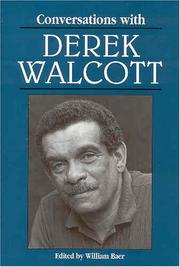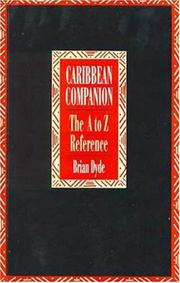| Listing 1 - 10 of 59 | << page >> |
Sort by
|
Book
ISBN: 0511790082 1108024521 Year: 2015 Publisher: Cambridge : Cambridge University Press,
Abstract | Keywords | Export | Availability | Bookmark
 Loading...
Loading...Choose an application
- Reference Manager
- EndNote
- RefWorks (Direct export to RefWorks)
Thomas Southey (1777-1838) joined the navy at the age of twelve, saw action during the French Revolutionary Wars, and was first posted to the West Indies in early 1804. Promoted to captain in 1811 and later employed as a customs officer, he died on the voyage home from his last posting in Demerara. His only book, published in 1827, is dedicated to his older brother, Robert, a Romantic poet, who also wrote on historical subjects (his books on Nelson, the Duke of Wellington, and Brazil are also available in the Cambridge Library Collection). Thomas's three-volume work draws on extensive reading, with substantial passages quoted verbatim from his sources. He concludes that the history of the West Indies presents 'little more than a melancholy series of calamities and crimes', but commends the British government's efforts to put an end to slavery. Volume 3 covers the period from 1784 to 1816.
West Indies --- History --- Antilles --- Caribbean Islands --- Islands of the Caribbean --- Islands of the Atlantic
Book
ISBN: 1612498191 1612498167 1612498175 Year: 2023 Publisher: Purdue University Press
Abstract | Keywords | Export | Availability | Bookmark
 Loading...
Loading...Choose an application
- Reference Manager
- EndNote
- RefWorks (Direct export to RefWorks)
Las ciudades del deseo explores the representations of gender, sexuality, and urban space in contemporary narratives from Cuba, the Dominican Republic, and Puerto Rico. By examining a corpus of novels published since 2000, this book shows how the changes in urban landscape create a new image of the city that destroys traditional gender roles and produces different discourses on sexuality. At moments of crisis in political agendas that took place between 1990 and 2000, queer subjects became spokespeople outlining new national projects on each island, while claiming space in the national imaginary. The nation is no longer built on blood ties, patriarchal norms, or biological procreation, but rather starts incorporating previously excluded racial identities and sexual practices. By juxtaposing the narratives of the three countries and putting into dialogue the topics of nationality, sexuality, urban space, and sex tourism, Las ciudades del deseo breaks away from a tradition that tends to study them separately. The book contributes new perspectives on an emerging culture of resistance to heteronormative dynamics and power structures that is developing simultaneously in Cuba, Puerto Rico, and the Dominican Republic. It sheds light on larger connections between literature and LGBTQ activism in the Spanish-speaking Caribbean.Las ciudades del deseo explora las representaciones del género, la sexualidad y el espacio urbano en la narrativa contemporánea de Cuba, la República Dominicana y Puerto Rico. Aportando un análisis de varias novelas publicadas después de 2000, el libro muestra cómo los cambios del paisaje urbano crean una imagen nueva de la ciudad que destruye roles de género tradicionales y produce múltiples discursos de sexualidad. Durante la crisis de las agendas políticas que sucede en 1990–2000 los sujetos queer esbozan nuevos proyectos nacionales en cada isla. La familia como metáfora de la nación deja de basarse en los lazos de sangre, normas patriarcales y procreación biológica. En cambio, empieza a incorporar identidades raciales y prácticas sexuales. Yuxtaponiendo las narrativas de los tres países y poniendo en diálogos los temas de la nación, la sexualidad, el espacio urbano y el turismo sexual, Las ciudades del deseo rompe con una tradición que tiende a explorarlos por separado. El libro contribuye a una perspectiva nueva de la emergente cultura de resistencia contra las dinámicas heteronormativas y estructuras de poder que se está desarrollando simultáneamente en los tres países y establece conexiones extensas entre la literatura y el activismo LGBTQ en el Caribe hispano.
Literature: history & criticism --- West Indies. --- Antilles --- Caribbean Islands --- Islands of the Caribbean --- Islands of the Atlantic
Book
Year: 2022 Publisher: Amsterdam Amsterdam University Press
Abstract | Keywords | Export | Availability | Bookmark
 Loading...
Loading...Choose an application
- Reference Manager
- EndNote
- RefWorks (Direct export to RefWorks)
This book fits into the (limited in scope) Dutch tradition of university research and publications on 'good lawmaking'. It takes into account the specific needs and possibilities of 'small island countries' with a limited administrative system and where the language of the legal regulations is different from the colloquial language of the majority of the population and civil servants. It builds on an earlier, somewhat similar work by the author, 100 Ideas for the Municipal Regulator (3rd Dr. 2018).
Book
Year: 2017 Publisher: Manchester : Manchester University Press,
Abstract | Keywords | Export | Availability | Bookmark
 Loading...
Loading...Choose an application
- Reference Manager
- EndNote
- RefWorks (Direct export to RefWorks)
This electronic version has been made available under a Creative Commons (BY-NC) open access license. This jointly authored book extends understanding of the use of sport to address global development agendas by offering an important departure from prevailing theoretical and methodological approaches in the field. Drawing on nearly a decade of wide-ranging multidisciplinary research undertaken with young people and adults living and working in urban communities in Zambia, the book presents a localised account that locates sport for development in historical, political, economic and social context. A key feature of the book is its detailed examination of the lives, experiences and responses of young people involved in sport for development activities, drawn from their own accounts. The book's unique approach and content will be highly relevant to academic researchers and post-graduate students studying sport and development in across many different contexts.
Caribbean islands --- Sociology: sport & leisure --- History of sport --- global development --- urban communities --- development --- zambia --- community integration --- local sport --- sport --- sport for development
Book
ISBN: 9789286155710 9286155719 Year: 2023 Publisher: European Investment Bank
Abstract | Keywords | Export | Availability | Bookmark
 Loading...
Loading...Choose an application
- Reference Manager
- EndNote
- RefWorks (Direct export to RefWorks)
Latin America and the Caribbean are increasingly experiencing the effects of climate change. Over the past two decades, the countries in the region have experienced as many as 1 350 natural disasters attributable to the climate, affecting more than 170 million people. We analysed climate risks in Latin America and the Caribbean, expanding the analysis to understand what these risks imply for the financial sector, particularly for banks. We conclude that the aggregate physical climate risk of the banking sector is the highest in the Caribbean while for transition risk the picture is more homogenous. Finally, we note that capital flows for climate projects in the Latin America and the Caribbean region have been lagging other regions in the world. Against the backdrop of considerable financing needs, the international financial community and public development banks have an important role to play to support both public and private green investments providing long-term, patient funding at affordable rates and sharing part of the risks.
natural hazard. --- risk management. --- green economy. --- economic transition. --- energy transition. --- banking policy. --- EU financing. --- financial institution. --- climate change. --- Latin America. --- Caribbean Islands.
Periodical
ISSN: 24706302 Year: 1949 Publisher: [Mona, Jamaica?] : London : Extra Mural Dept. of the University College of the West Indies, Taylor & Francis
Abstract | Keywords | Export | Availability | Bookmark
 Loading...
Loading...Choose an application
- Reference Manager
- EndNote
- RefWorks (Direct export to RefWorks)
Caribbean Quarterly, published since 1949, is the flagship journal of culture of the University of the West Indies. The refereed journal concerns itself with Caribbean culture in all its ramifications. It is an outlet for the publication of results of research into, and considered views on, matters Caribbean. Normally an issue contains six to eight articles of original thought, which are of general interest and relevance to the Caribbean islands and the neighbouring mainland of Central and South America. The journal comprises scholarly articles, essays, criticism, creative writing, and book reviews. An overall picture of life in one of the most culturally diverse parts of the Western hemisphere emerges with information on its culture, ethnology, history, peoples, religion and creative arts. The journal appears in March, June, September and December.
Civilization. --- West Indies --- Antilles --- West Indies. --- Civilization --- Civilisation --- Barbarism --- Caribbean Islands --- Islands of the Caribbean --- Auxiliary sciences of history --- Culture --- Caribbean Area --- Atlantic Ocean --- Islands of the Atlantic --- Indie Zachodnie (region) --- Història --- Carib (Regió) --- Història.
Book
ISBN: 9070990490 Year: 1994 Publisher: The Hague NIDI
Abstract | Keywords | Export | Availability | Bookmark
 Loading...
Loading...Choose an application
- Reference Manager
- EndNote
- RefWorks (Direct export to RefWorks)
Demography --- -Historical demography --- Social sciences --- Population --- Vital statistics --- West Indies --- Antilles --- Caribbean Islands --- Islands of the Caribbean --- Islands of the Atlantic --- Population. --- -West Indies --- Historical demography --- Aruba --- Teritorio Insular di Aruba

ISBN: 0878058559 0878058540 9780878058556 Year: 1996 Publisher: Jackson University press of Mississippi
Abstract | Keywords | Export | Availability | Bookmark
 Loading...
Loading...Choose an application
- Reference Manager
- EndNote
- RefWorks (Direct export to RefWorks)
When Derek Walcott was awarded the Nobel Prize, he was cited for ""a poetic oeuvre of great luminosity, sustained by a historical vision, the outcome of a multicultural commitment."" The lively interviews in this collection reveal Walcott's generous and brilliant intelligence as well as his strong, forthright opinions. He discusses the craft of poetry, the status of contemporary poetry and drama, his founding of the Trinidad Theatre Workshop, and his views on a number of influential writers, including Eliot, Auden, Brodsky, Heaney, and Naipaul.Boldly speaking his mind, Walcott takes many controversial positions on a wide range of subjects, such as Caribbean and U.S. politics, literary instruction in American universities, the proper role of sound in modern poetry, and the ""ego"" apparent in contemporary American poetry, and problems of race. Whatever the subject, Walcott responds fully and candidly.
Authors, West Indian --- West Indian authors --- Walcott, Derek --- والكوت، ديرك --- デレク・ウォルコット --- West Indies --- Antilles --- Caribbean Islands --- Islands of the Caribbean --- Islands of the Atlantic --- Intellectual life --- Auteurs indiens d'Amérique --- Inde (ouest) --- Vie intellectuelle --- Auteurs indiens d'Amérique

ISBN: 0333545591 Year: 1992 Publisher: New York, NY : MacMillan,
Abstract | Keywords | Export | Availability | Bookmark
 Loading...
Loading...Choose an application
- Reference Manager
- EndNote
- RefWorks (Direct export to RefWorks)
Caribbean Area --- West Indies --- Antilles --- Caribbean Islands --- Islands of the Caribbean --- Caribbean Free Trade Association countries --- Caribbean Region --- Caribbean Sea Region --- West Indies Region --- Handbooks, manuals, etc. --- Islands of the Atlantic --- Caribbean culture --- Caribbean history

ISBN: 0817313303 9780817313302 9780817310936 0817310932 Year: 2001 Publisher: Tuscaloosa University of Alabama Press
Abstract | Keywords | Export | Availability | Bookmark
 Loading...
Loading...Choose an application
- Reference Manager
- EndNote
- RefWorks (Direct export to RefWorks)
This comprehensive study of the historical archaeology of the Caribbean provides sociopolitical context for the ongoing development of national identities. Long before the founding of Jamestown in 1607, there were Spanish forts, bustling towns, sugar plantations, and sea trade flourishing in the Caribbean. While richer nations, particularly the United States, may view the Caribbean today as merely a place for sun and fun, the island colonies were at one time far more important and lucrative to their European empire countries than their North American counterparts. From t
Land settlement patterns --- Archaeology and history --- Patterns, Land settlement --- Settlement patterns --- Human geography --- Land settlement --- Historical archaeology --- History and archaeology --- History --- History. --- West Indies --- Antilles --- Caribbean Islands --- Islands of the Caribbean --- Islands of the Atlantic --- Antiquities. --- Civilization. --- Civilization --- Antiquities
| Listing 1 - 10 of 59 | << page >> |
Sort by
|

 Search
Search Feedback
Feedback About UniCat
About UniCat  Help
Help News
News